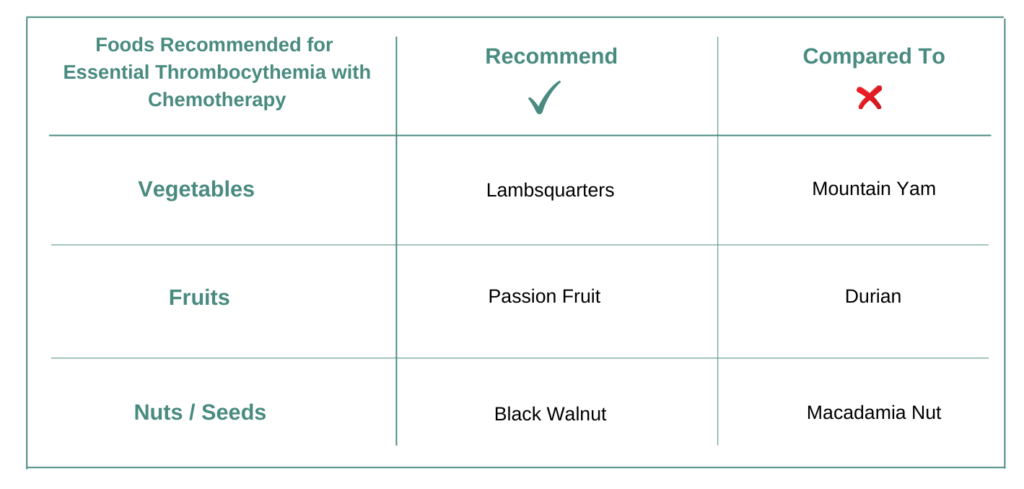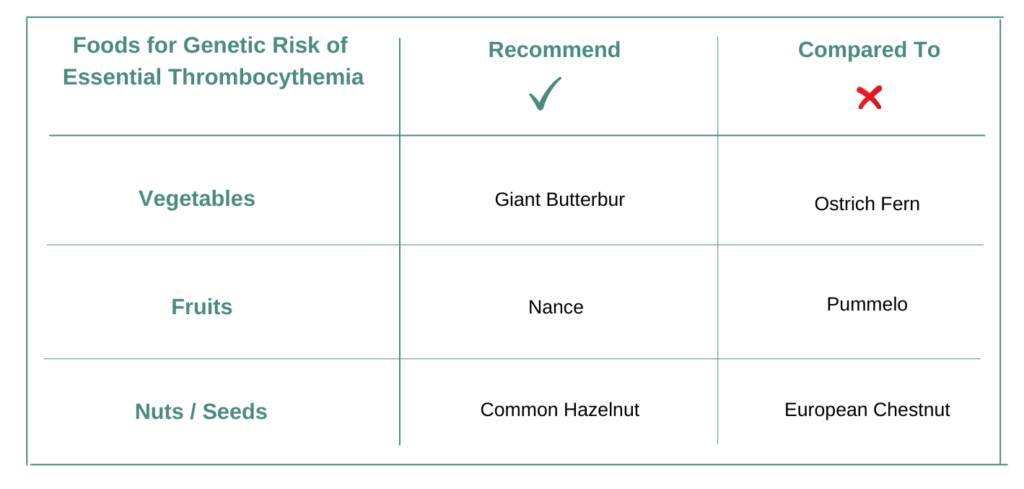Introduction
Foods for Essential Thrombocythemia should be personalized for each individual and also must adapt when cancer treatment or tumor genetic change. The personalization and adaptation must consider all the active ingredients or bioactives contained in different foods with respect to cancer tissue biology, genetics, treatments, lifestyle conditions and diet preferences. Hence while nutrition is one of the very important decisions for a cancer patient and individual at risk of cancer to make – how to choose foods to eat is not an easy task.
Essential thrombocythemia (ET) is a rare blood disorder that results in patients having increased numbers of platelets. This is part of a family of myeloproliferative neoplasms (MPN). Platelets are the smallest blood cells that are needed for successful clotting of the blood after an injury. Most people with an elevated platelet count do not have essential thrombocythemia and this may occur due to iron deficiency, infection, or generalized inflammation. ET is caused by an internal genetic defect leading to excessive production of abnormal blood cells, and therefore can be considered as a chronic type of leukemia, but with an overall excellent prognosis and often requiring minimal to no treatment. One of the key genes found to be mutated in ET is a kinase JAK2, and in 40% of ET patients without a JAK2 mutation, CALR (calreticulin) gene is mutated. Women are more likely to be diagnosed with ET than men. The greatest health risk in patients with ET is an increased risk of developing blood clots. Blood clots can develop in the deep vessels of the legs or lungs. Patients with ET are also more likely to experience strokes and heart attacks. Other symptoms in ET also include headaches, fatigue, temporary changes in vision, dizziness, ringing in the ears, vertigo and tingling in the hands. ET can very rarely transform, in about 1-2% of patients, into a more severe related disease called myelofibrosis or into acute leukemia. Treatment for essential thrombocythemia is targeted towards reducing the risk of clotting events and patients are treated with low dose aspirin. For patients considered at high risk for clotting, a stronger medicine such as hydroxyurea is used. There are other additional medicines and chemotherapy that can be utilized to reduce the risk of clotting. Smoking increases the risk of clotting in patients with ET and it is recommended to avoid smoking. Additionally, the right nutrition (foods and natural supplements) can improve the well-being of patients’ with ET.
For Essential Thrombocythemia does it matter what vegetables, fruits, nuts, seeds one eats?
A very common nutrition question asked by cancer patients and individuals at-genetic risk of cancer is – for cancers like Essential Thrombocythemia does it matter what foods I eat and which I do not? Or if I follow a plant-based diet is that enough for cancer like Essential Thrombocythemia?
For example does it matter if vegetable Lambsquarters is consumed more compared to Mountain Yam? Does it make any difference if fruit Durian is preferred over Passion Fruit? Also if similar choices are made for nuts/seeds like Black Walnut over Macadamia Nut and for pulses like Chickpea over Catjang Pea. And if what I eat matters – then how does one identify foods which are recommended for Essential Thrombocythemia and is it the same answer for everyone with the same diagnosis or genetic risk?
Yes! Foods you eat matters for Essential Thrombocythemia!
Food recommendations may not be the same for everyone and can be different even for the same diagnosis and genetic risk.

All foods (vegetables, fruits, nuts, seeds, pulses, oils etc.) and nutritional supplements are made up of more than one active molecular ingredient or bio-actives in different proportions and quantities. Each active ingredient has a unique mechanism of action – which can be activation or inhibition of different biochemical pathways. Simply stated foods and supplements which are recommended are those which do not cause an increase of molecular drivers of cancer but reduce them. Else those foods should not be recommended. Foods contain multiple active ingredients – hence when evaluating foods and supplements you need to consider the impact of all active ingredients cumulatively rather than individually.
For example Durian contains active ingredients Curcumin, Apigenin, Bergapten, Formononetin, Lycopene. And Passion Fruit contains active ingredients Curcumin, Apigenin, Bergapten, Formononetin, Vitamin C and possibly others.
A common mistake made when deciding and choosing foods to eat for Essential Thrombocythemia – is to evaluate only selected active ingredients contained in foods and ignore the rest. Because different active ingredients contained in foods may have opposing effects on cancer drivers – you cannot cherry pick active ingredients in foods and supplements for making a nutrition decision for Essential Thrombocythemia.
YES – FOOD CHOICES MATTER FOR CANCER. NUTRITION DECISIONS MUST CONSIDER ALL ACTIVE INGREDIENTS OF FOODS.
Skills Needed for Nutrition Personalization for Essential Thrombocythemia?
Personalized nutrition for cancers like Essential Thrombocythemia consists of recommended foods / supplements; not recommended foods / supplements with example recipes which prioritize use of recommended foods. An example of personalized nutrition can be seen at this link.
Deciding which foods are recommended or not is extremely complicated, requiring expertise in Essential Thrombocythemia biology, food science, genetics, biochemistry along with good understanding of how cancer treatments work and associated vulnerabilities by which the treatments could stop being effective.
MINIMUM KNOWLEDGE EXPERTISE NEEDED FOR NUTRITION PERSONALIZATION FOR CANCER ARE: CANCER BIOLOGY, FOOD SCIENCE, CANCER TREATMENTS AND GENETICS.
Foods to Eat After Cancer Diagnosis!
No two cancers are the same. Go beyond the common nutrition guidelines for everyone and make personalized decisions about food and supplements with confidence.
Characteristics of cancers like Essential Thrombocythemia
All cancers like Essential Thrombocythemia can be characterized by a unique set of biochemical pathways – the signature pathways of Essential Thrombocythemia. Biochemical pathways like Suppressive Histone Methylation, Noncoding RNA Signaling, Oncogenic Cancer Epigenetics, Hypoxia are part of the signature definition of Essential Thrombocythemia. Each individual’s cancer genetics can be different and hence their specific cancer signature could be unique.
The treatments which are effective for Essential Thrombocythemia need to be cognizant of the associated signature biochemical pathways for each cancer patient and individual at genetic risk. Therefore different treatments with different mechanisms of actions are effective for different patients. Similarly and for the same reasons foods and supplements need to be personalized for each individual. Hence some foods and supplements are recommended for Essential Thrombocythemia when taking cancer treatment Imatinib, and some foods and supplements are not recommended.
Sources like cBioPortal and many others provide population representative patient anonymized data from clinical trials for all cancer indications. This data consists of clinical trial study details like sample size / number of patients, age groups, gender, ethnicity, treatments, tumor site and any genetic mutations.
CALR, BCOR, TET2, EZH2 and MPL are the top ranked reported genes for Essential Thrombocythemia. CALR is reported in 29.2 % of the representative patients across all clinical trials. And BCOR is reported in 6.2 %. The combined population patient data cover ages from to . 100.0 % of the patient data are identified as men. The Essential Thrombocythemia biology along with reported genetics together define the population represented signature biochemical pathways for this cancer. If the individual cancer tumor genetics or genes contributing to the risk are also known then that should also be used for nutrition personalization.
NUTRITION CHOICES SHOULD MATCH WITH EACH INDIVIDUAL’S CANCER SIGNATURE.
Food and Supplements for Essential Thrombocythemia
For Cancer Patients
Cancer patients on treatment or on palliative care need to make decisions on food and supplements – for the needed dietary calories, for managing any treatment side effects and also for improved cancer management. All plant-based foods are not equal and choosing and prioritizing foods which are personalized and customized to ongoing cancer treatment is important and complicated. Here are some examples providing guidelines for making nutrition decisions.
Choose Vegetable LAMBSQUARTERS or MOUNTAIN YAM?
Vegetable Lambsquarters contains many active ingredients or bioactives such as Curcumin, Apigenin, Bergapten, Formononetin, Vitamin C. These active ingredients manipulate various biochemical pathways like RAS-RAF Signaling, MYC Signaling and PI3K-AKT-MTOR Signaling and others. Lambsquarters is recommended for Essential Thrombocythemia when ongoing cancer treatment is Imatinib. This is because Lambsquarters modifies those biochemical pathways which have been scientifically reported to sensitize the effect of Imatinib.
Some of the active ingredients or bioactives in vegetable Mountain Yam are Curcumin, Apigenin, Bergapten, Formononetin, Lycopene. These active ingredients manipulate various biochemical pathways like Oncogenic Cancer Epigenetics and PI3K-AKT-MTOR Signaling and others. Mountain Yam is not recommended for Essential Thrombocythemia when ongoing cancer treatment is Imatinib because it modifies those biochemical pathways which make the cancer treatment resistant or less responsive.
VEGETABLE LAMBSQUARTERS IS RECOMMENDED OVER MOUNTAIN YAM FOR Essential Thrombocythemia AND TREATMENT Imatinib.
Choose Fruit PASSION FRUIT or DURIAN?
Fruit Passion Fruit contains many active ingredients or bioactives such as Curcumin, Apigenin, Bergapten, Formononetin, Vitamin C. These active ingredients manipulate various biochemical pathways like RAS-RAF Signaling, MYC Signaling and PI3K-AKT-MTOR Signaling and others. Passion Fruit is recommended for Essential Thrombocythemia when ongoing cancer treatment is Imatinib. This is because Passion Fruit modifies those biochemical pathways which have been scientifically reported to sensitize the effect of Imatinib.
Some of the active ingredients or bioactives in fruit Durian are Curcumin, Apigenin, Bergapten, Formononetin, Lycopene. These active ingredients manipulate various biochemical pathways like Oncogenic Cancer Epigenetics and PI3K-AKT-MTOR Signaling and others. Durian is not recommended for Essential Thrombocythemia when ongoing cancer treatment is Imatinib because it modifies those biochemical pathways which make the cancer treatment resistant or less responsive.
FRUIT PASSION FRUIT IS RECOMMENDED OVER DURIAN FOR Essential Thrombocythemia AND TREATMENT Imatinib.
Choose Nut BLACK WALNUT or MACADAMIA NUT?
Black Walnut contains many active ingredients or bioactives such as Curcumin, Quercetin, Apigenin, Ellagic Acid, Bergapten. These active ingredients manipulate various biochemical pathways like RAS-RAF Signaling, MYC Signaling and PI3K-AKT-MTOR Signaling and others. Black Walnut is recommended for Essential Thrombocythemia when ongoing cancer treatment is Imatinib. This is because Black Walnut modifies those biochemical pathways which have been scientifically reported to sensitize the effect of Imatinib.
Some of the active ingredients or bioactives in Macadamia Nut are Curcumin, Apigenin, Bergapten, Formononetin, Daidzein. These active ingredients manipulate various biochemical pathways like MYC Signaling, Oncogenic Cancer Epigenetics and PI3K-AKT-MTOR Signaling and others. Macadamia Nut is not recommended for Essential Thrombocythemia when ongoing cancer treatment is Imatinib because it modifies those biochemical pathways which make the cancer treatment resistant or less responsive.
BLACK WALNUT IS RECOMMENDED OVER MACADAMIA NUT FOR Essential Thrombocythemia AND TREATMENT Imatinib.

For Individuals with Genetic Risk of Cancer
The question asked by individuals who have genetic risk of Essential Thrombocythemia or familial history is “What Should I Eat Differently from Before?” and how they should choose foods and supplements to manage risks of the disease. Since for cancer risk there is nothing actionable in terms of treatment – decisions of foods and supplements become important and one of the very few actionable things which can be done. All plant-based foods are not equal and based on identified genetics and pathway signature – the choices of food and supplements should be personalized.
Choose Vegetable GIANT BUTTERBUR or OSTRICH FERN?
Vegetable Giant Butterbur contains many active ingredients or bioactives such as Apigenin, Curcumin, Formononetin, Lupeol, Bergapten. These active ingredients manipulate various biochemical pathways like Cell Cycle Checkpoints, MYC Signaling, Endoplasmic Reticulum Stress and PI3K-AKT-MTOR Signaling and others. Giant Butterbur is recommended for risk of Essential Thrombocythemia when associated genetic risk is BCOR. This is because Giant Butterbur increases those biochemical pathways which counteract the signature drivers of it.
Some of the active ingredients or bioactives in vegetable Ostrich Fern are Apigenin, Curcumin, Formononetin, Lupeol, Bergapten. These active ingredients manipulate various biochemical pathways like Cell Cycle Checkpoints, Post Translation Modification and Endoplasmic Reticulum Stress and others. Ostrich Fern is not recommended when risk of Essential Thrombocythemia when associated genetic risk is BCOR because it increases the signature pathways of it.
VEGETABLE GIANT BUTTERBUR IS RECOMMENDED OVER OSTRICH FERN FOR BCOR GENETIC RISK OF CANCER.
Choose Fruit NANCE or PUMMELO?
Fruit Nance contains many active ingredients or bioactives such as Apigenin, Curcumin, Formononetin, Lupeol, Bergapten. These active ingredients manipulate various biochemical pathways like Cell Cycle Checkpoints, MYC Signaling, Endoplasmic Reticulum Stress and PI3K-AKT-MTOR Signaling and others. Nance is recommended for risk of Essential Thrombocythemia when associated genetic risk is BCOR. This is because Nance increases those biochemical pathways which counteract the signature drivers of it.
Some of the active ingredients or bioactives in fruit Pummelo are Apigenin, Curcumin, Quercetin, Formononetin, Lupeol. These active ingredients manipulate various biochemical pathways like Post Translation Modification and Endoplasmic Reticulum Stress and others. Pummelo is not recommended when risk of Essential Thrombocythemia when associated genetic risk is BCOR because it increases the signature pathways of it.
FRUIT NANCE IS RECOMMENDED OVER PUMMELO FOR BCOR GENETIC RISK OF CANCER.
Choose Nut COMMON HAZELNUT or EUROPEAN CHESTNUT?
Common Hazelnut contains many active ingredients or bioactives such as Curcumin, Quercetin, Formononetin, Lupeol, Bergapten. These active ingredients manipulate various biochemical pathways like Cell Cycle Checkpoints, MYC Signaling, Noncoding RNA Signaling and PI3K-AKT-MTOR Signaling and others. Common Hazelnut is recommended for risk of Essential Thrombocythemia when associated genetic risk is BCOR. This is because Common Hazelnut increases those biochemical pathways which counteract the signature drivers of it.
Some of the active ingredients or bioactives in European Chestnut are Apigenin, Curcumin, Quercetin, Formononetin, Lupeol. These active ingredients manipulate various biochemical pathways like Endoplasmic Reticulum Stress and Oncogenic Cancer Epigenetics and others. European Chestnut is not recommended when risk of Essential Thrombocythemia when associated genetic risk is BCOR because it increases the signature pathways of it.
COMMON HAZELNUT IS RECOMMENDED OVER EUROPEAN CHESTNUT FOR BCOR GENETIC RISK OF CANCER.

In Conclusion
Foods and Supplements chosen are important decisions for cancers like Essential Thrombocythemia. Essential Thrombocythemia patients and individuals with genetic-risk always have this question: “What foods and nutritional supplements are recommended for me and which are not?” There is a common belief which is a misconception that all plant-based foods could be beneficial or not but would not be harmful. Certain foods and supplements can interfere with cancer treatments or promote molecular pathway drivers of cancer.
There are different types of cancer indications like Essential Thrombocythemia, each with different tumor genetics with further genomic variations across each individual. Further every cancer treatment and chemotherapy has a unique mechanism of action. Each food like Lambsquarters contains various bioactives in different quantities, which have an impact on different and distinct sets of biochemical pathways. The definition of personalized nutrition is individualized food recommendations for the cancer indication, treatments, genetics, lifestyle and other factors. Nutrition personalization decisions for cancer require knowledge of cancer biology, food science and an understanding of different chemotherapy treatments. Finally when there are treatment changes or new genomics is identified – the nutrition personalization needs re-evaluation.
The addon nutrition personalization solution makes the decision making easy and removes all the guesswork in answering the question, “What foods should I choose or not choose for Essential Thrombocythemia?”. The addon multi-disciplinary team includes cancer physicians, clinical scientists, software engineers and data scientists.
Personalized Nutrition for Cancer!
Cancer changes with time. Customize and modify your nutrition based on cancer indication, treatments, lifestyle, food preferences, allergies and other factors.
References
- Pancan Pcawg 2020
- Retinol decreases beta-catenin protein levels in retinoic acid-resistant colon cancer cell lines.
- α-pinene regulates miR-221 and induces G2/M phase cell cycle arrest in human hepatocellular carcinoma cells.
- Dietary compound isoliquiritigenin targets GRP78 to chemosensitize breast cancer stem cells via β-catenin/ABCG2 signaling.
- Lycopene attenuated hepatic tumorigenesis via differential mechanisms depending on carotenoid cleavage enzyme in mice.
- https://rarediseases.org/rare-diseases/essential-thrombocythemia
- https://www.lls.org/sites/default/files/file_assets/essentialprimarythrombocythemia.pdf
